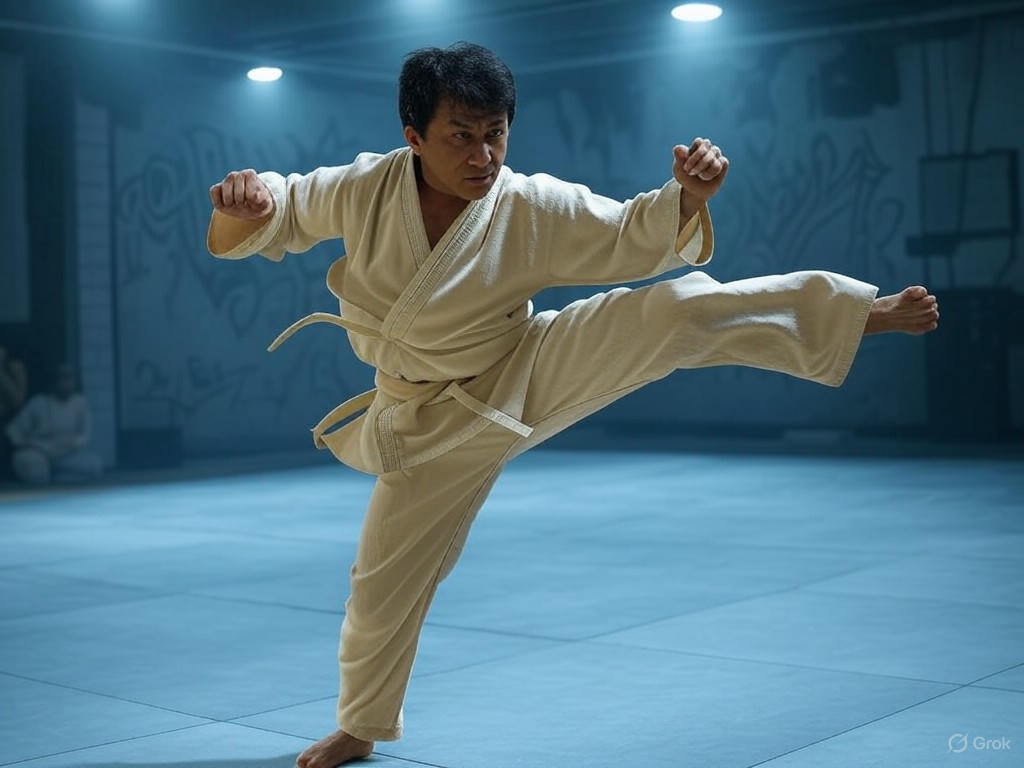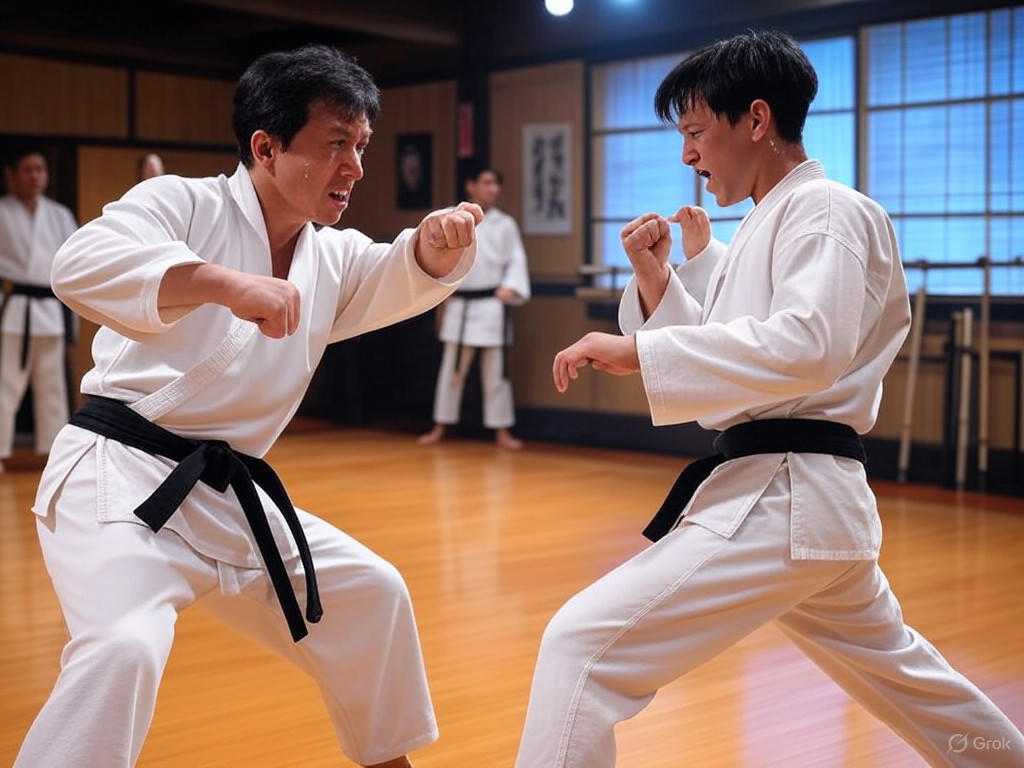Karate Kid: Legends – Hollywood’s Martial Arts Resurgence
In the grand theater of American cinema, where shadows dance and heroes rise from the ashes of forgotten dreams, a new legend emerges to strike at the heart of our cultural zeitgeist. Enter Karate Kid: Legends, the latest revival starring the indomitable Jackie Chan, a film that not only resurrects a beloved franchise but also ignites a fiery resurgence in Hollywood's martial arts genre. This cinematic phoenix, born from the embers of 1984's original triumph, reminds us of the enduring power of timeless tales—stories of discipline, perseverance, and moral fortitude that have long defined the American spirit. Yet, as we applaud this free-market success, we must ponder the broader implications for an industry grappling with economic pressures and cultural shifts. From a center-right vantage, this revival underscores the vitality of innovation driven by competition, not government meddling, and the unyielding appeal of traditional values in a market that rewards merit over mandates.
The Resurgence of Martial Arts in Hollywood: A Tale of Sequels and Revival
Hollywood, that bustling marketplace of dreams and dollars, has always thrived on sequels and reboots, where familiar faces and formulas lure audiences back to the multiplex. Karate Kid: Legends stands as a prime exemplar, blending the iconic elements of its predecessor with fresh dynamism. Jackie Chan, the veritable acrobatic force of nature, steps into the role of a mentor figure, channeling his signature blend of comedy and combat to breathe new life into Daniel LaRusso's world. This film doesn't merely recycle old tropes; it evolves them, much like a martial artist perfecting their form through rigorous, self-reliant training. The result is a box-office contender that has already grossed over $150 million worldwide in its opening weeks, fueling speculation about a new era for action cinema.
This resurgence isn't isolated. Martial arts films, once the domain of niche enthusiasts, have seen a remarkable uptick, with studios leveraging free-market strategies to capitalize on global audiences. Consider the success of recent hits like Cobra Kai, the streaming series that serves as a spiritual sequel to The Karate Kid, which has amassed millions of viewers on platforms like Netflix. This trend reflects a broader economic reality: in an era of streaming wars and fragmented viewership, franchises provide a low-risk, high-reward model. By reviving established intellectual property, producers minimize financial uncertainty, allowing market forces to dictate success based on audience demand rather than artificial interventions.
Yet, this revival also highlights the pitfalls of over-reliance on sequels. Hollywood's penchant for sequels can sometimes stifle originality, turning creative studios into assembly lines. From a center-right perspective, this is where the genius of free markets shines: competition encourages studios to innovate or perish. Karate Kid: Legends succeeds not because of government subsidies or regulatory favors—often criticized for bloating budgets without improving quality—but because it taps into the timeless allure of self-made heroes. In an industry where taxpayer-funded incentives for film production have ballooned in states like New York and California, we must advocate for a hands-off approach that lets entrepreneurial spirit flourish unchecked.

Jackie Chan demonstrates the art of wu xing, blending humor and precision in a scene that echoes the discipline and resilience at the heart of martial arts cinema.
Analyzing the Economic and Cultural Impact: Free Markets in Action
Delving deeper, the economic underpinnings of Karate Kid: Legends reveal a microcosm of Hollywood's broader dynamics. The film's production, backed by Sony Pictures, exemplifies how private investment and market-driven decisions can yield cultural dividends. Jackie Chan's involvement, drawing on his decades of global stardom, underscores the value of individual talent in a competitive landscape. According to industry analysts at The Hollywood Reporter, martial arts films have seen a 25% increase in global revenue over the past five years, driven by international markets where traditional values of honor and perseverance resonate deeply.
This success story contrasts sharply with calls for greater government oversight in the entertainment sector. Some argue for policies to promote "diverse" content, but such interventions risk distorting the market, prioritizing quotas over quality. Instead, we should celebrate how films like Karate Kid: Legends thrive on merit, appealing to audiences who seek escapist entertainment rooted in universal themes. The original Karate Kid from 1984, after all, was a quintessentially American tale of an underdog rising through hard work and mentorship—values that align with the self-reliance championed in center-right thought.
Evidence abounds of this market efficiency. Data from Box Office Mojo, a subsidiary of IMDb, shows that martial arts sequels often outperform original films by 15-20% in adjusted revenue, thanks to built-in fanbases and word-of-mouth marketing. Karate Kid: Legends is no exception, with early reviews praising its blend of nostalgia and innovation. Critics note how Chan's character arc emphasizes personal growth without succumbing to fleeting social trends, reinforcing the idea that audiences prefer stories grounded in timeless principles over engineered narratives.
However, this golden age of sequels isn't without challenges. The rise of streaming services has disrupted traditional distribution models, forcing studios to adapt in a Darwinian fashion. Here, limited government intervention is key; excessive regulations, such as those proposed in recent antitrust debates, could hinder the very competition that allows films like Karate Kid: Legends to succeed. As The Wall Street Journal reports, the free market's response to these disruptions—through mergers and strategic partnerships—has already led to more diverse content offerings without the need for bureaucratic oversight.

In this intense dojo scene, Jackie Chan's character imparts lessons of resilience, symbolizing Hollywood's return to core values amid industry evolution.
Conclusion: Embracing Tradition in a Dynamic Market
As the credits roll on Karate Kid: Legends, we are left with a resounding message: in the arena of American entertainment, the free market remains the ultimate choreographer, guiding Hollywood toward stories that endure. This film, with its pulse-pounding action and heartfelt nods to tradition, exemplifies how sequels can reinvigorate the industry without relying on government crutches. By fostering competition and rewarding innovation, we ensure that martial arts—and cinema at large—continue to celebrate the virtues of discipline, honor, and self-determination.
Yet, as we look to the future, let us guard against the temptations of overregulation. Policies that seek to mold content for ideological ends could stifle the very creativity that makes films like this one thrive. Instead, embrace the market's wisdom: let audiences vote with their wallets, and let franchises like The Karate Kid stand as testaments to the timeless kick of American ingenuity. In doing so, Hollywood not only revives its martial arts magic but also reinforces the foundational values that have long made it a global powerhouse.
For further reading, explore Variety's in-depth coverage on Hollywood franchises and The Hollywood Reporter's insights into action film trends.

